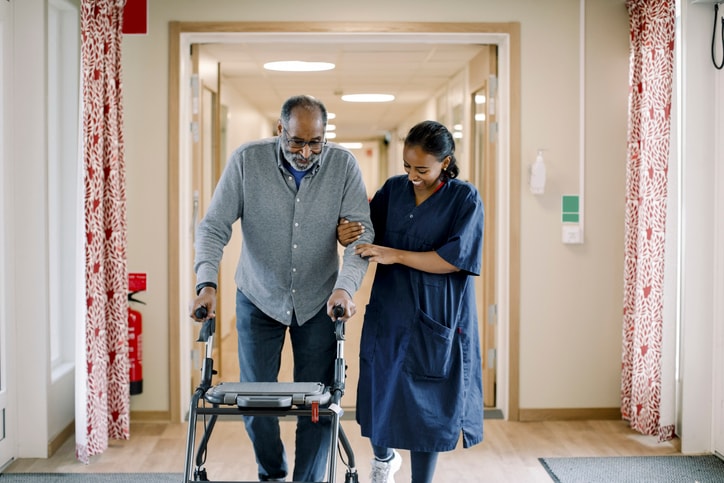Discover premium Assisted Living residences with exceptional amenities.
Discover premium Assisted Living residences with exceptional amenities.
Blog Article
How Helped Living Facilities Enhance High Quality of Life for Those With Dementia
Assisted living facilities play a crucial duty in boosting the lifestyle for individuals with mental deterioration by implementing customized treatment strategies that satisfy their distinct needs. These atmospheres integrate organized activities with psychological assistance, fostering a feeling of community while making certain safety and self-reliance. The assimilation of engaging programs and household involvement better improves the homeowners' experience. Yet, the intricacies of dementia care remain to evolve, prompting a better assessment of how these facilities adapt and introduce to satisfy the challenges encountered by citizens and their households. What implications does this have for future treatment models?
Personalized Care Plans
(Dementia Care Charlotte)In a lot of cases, people with dementia call for customized support that resolves their special needs and choices. Customized care strategies are crucial in assisted living settings, as they make sure that each resident receives suitable focus and solutions. These strategies are developed collaboratively, including health care specialists, caretakers, and member of the family to develop a thorough overview of the person's medical background, cognitive abilities, and individual passions.
A well-structured tailored care strategy commonly includes particular objectives associated to wellness monitoring, day-to-day activities, and social interaction. It represents the individual's cognitive decrease while promoting freedom and dignity. Routine analyses and updates to the care strategy are vital, as they permit alterations based upon the local's evolving condition and preferences.
Key components of these plans usually include medicine monitoring, behavioral support strategies, and nutritional standards customized to the person's requirements (Assisted Living). By concentrating on personalized care, aided living facilities can cultivate a supportive setting that boosts the high quality of life for people with dementia, eventually adding to their overall wellness and happiness. This customized approach appreciates the uniqueness of each homeowner, ensuring they receive the thoughtful care they require

Engaging Activities and Programs
Involving locals in meaningful tasks and programs is essential for boosting the quality of life for individuals with mental deterioration. These tasks not only supply satisfaction however also stimulate cognitive function and promote social communication, which can mitigate feelings of seclusion commonly experienced by homeowners.

Furthermore, individualized programs are important in making sure that each citizen's distinct choices and capabilities are recognized. This tailored technique urges involvement, boosts self-esteem, and supplies a feeling of achievement.
Moreover, regular assessments of residents' interests can aid staff modify and adapt activities to better suit progressing needs. By focusing on interesting activities and programs, aided living centers can significantly improve the total experience and psychological wellness of individuals dealing with mental deterioration.
Safe and Encouraging Setting
Creating a risk-free and encouraging environment is necessary for people with mental deterioration, as it straight affects their health and quality of life. Aided living centers are designed with details features that advertise security while cultivating a complacency and comfort. These environments focus on accessibility, with formats that minimize confusion and encourage self-reliance, enabling residents to navigate their environments more quickly.
Security actions, such as protected entryways and leaves, prevent roaming and unauthorized accessibility, which are important considerations for people with dementia (Memory Care). Personnel are educated to acknowledge the one-of-a-kind requirements of homeowners, offering customized support and supervision to guarantee their safety and security. The incorporation of soothing shades and familiar things can help lower anxiety and disorientation, creating a more reassuring atmosphere.
Along with physical safety and security, psychological support is extremely important. Facilities frequently employ personnel who are not only skilled in caregiving but additionally educated in empathy and interaction, promoting trust fund and connection with homeowners. This all natural approach adds to a nurturing environment where individuals feel valued and understood, eventually boosting their total lifestyle.
Social Interaction and Neighborhood
A supportive environment not just focuses on security however likewise cultivates possibilities for social communication and community involvement, which are important for individuals with mental deterioration. In assisted living centers, structured tasks and common spaces urge homeowners to get in touch with each other, lowering sensations of isolation typically experienced by those with cognitive problems.
Social interaction plays a considerable function in improving emotional well-being and cognitive function (Memory Care). Involving with peers in team tasks such as video games, arts and crafts, or exercise not just promotes cognitive capabilities however likewise supports a feeling of belonging. Facilities usually arrange events that advertise socializing, allowing citizens to build relationships and share experiences, which can be especially beneficial for those with mental deterioration
Additionally, a vibrant neighborhood ambience can improve the total lifestyle for citizens. Personnel are educated to facilitate interactions and support citizens in developing significant connections. By creating a society of involvement, aided living facilities help people with mental deterioration preserve social abilities and boost their mood, ultimately adding to a much more fulfilling life experience. This community-oriented technique is vital in taking care of the difficulties connected with mental find more deterioration, promoting a feeling of function and continuity for residents.
Household Participation and Assistance
Household participation is crucial in sustaining individuals with mental deterioration in assisted living settings. Proactively involving member of the family not just supplies psychological convenience to homeowners but also promotes a sense of belonging and connection in their lives. When households get involved in treatment planning and everyday activities, they contribute beneficial understandings concerning the individual's choices, background, and needs, which can boost personalized care.
Additionally, normal family sees can significantly improve the emotional well-being of locals, lowering sensations of isolation and anxiety. Relative can likewise help in keeping cognitive function by involving their enjoyed ones in familiar conversations and activities. This interaction reinforces individuality and helps locals feel valued and comprehended.

Conclusion
To conclude, aided living centers substantially improve the lifestyle for people with mental deterioration with personalized treatment plans, engaging tasks, and a risk-free environment. These elements foster cognitive excitement, emotional well-being, and a feeling of self-reliance. Regular social communications and strong family participation contribute to purposeful connections and psychological assistance. Collectively, these aspects create an all natural method to care that addresses the one-of-a-kind needs of individuals with mental deterioration, advertising overall health and dignity.
Report this page